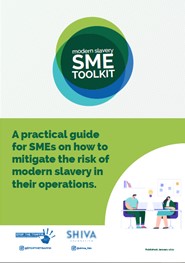This toolkit, jointly developed by STOP THE TRAFFIK and Shiva Foundation, seeks to provide practical guidance for small and medium-sized enterprises (SMEs) on how they can prevent modern slavery in their business operations. We recognise that many useful resources are available already and we provide reference to them in our further resources list, however, none of the existing free resources are designed specifically for SMEs. SMEs are crucial to the UK economy, employing over 60% of those working in the private sector. Therefore, SMEs are also crucial to preventing modern slavery and should be at the centre of the national strategy. Section 54 of the Modern Slavery Act, the UK’s flagship legislation to prevent modern slavery, is designed so that large companies are targeted by the legislation and in turn cascade awareness and mitigation efforts down their supply chains to smaller businesses. Although the learnings are gradually being passed on to SMEs in this way, we believe that more needs to be done to provide the SMEs with the tools to proactively prevent modern slavery themselves.

